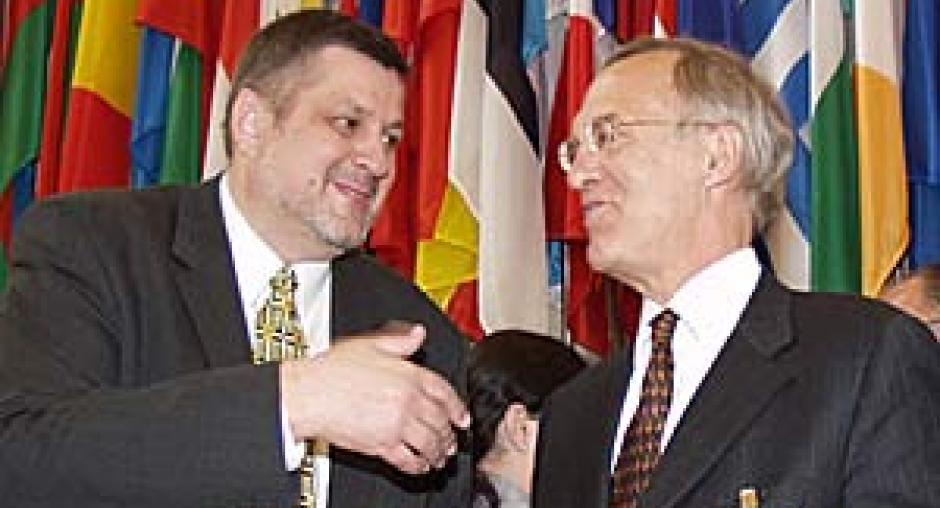Newsroom
Prague Economic Forum ends with concrete anti-trafficking measures recommended to OSCE States
PRAGUE 23 May 2003

(OSCE)Jan Kubis, the OSCE Secretary General (left), and Daan Everts, Personal Representative of the CiO, at the opening of the 11th Economic Forum in Prague, 20 May 2003. (OSCE) Photo details
PRAGUE, 23 May 2003 - Stronger involvement of the business community and the establishment of an international network of anti-trafficking non-governmental organizations, brokered by the OSCE, are among the key recommendations discussed at the 11th OSCE Economic Forum, which ended today in Prague.
The recommendations also included the establishment of a special OSCE representative to keep the fight against trafficking on the international agenda.
More than 400 participants from the 55 OSCE participating States - gathered in the Czech capital from 20 to 23 May - agreed that the time for action had come in the fight against trafficking in human beings, drugs and small arms and light weapons.
"The challenge is to keep the fight against trafficking on the international political agenda, and a top priority for the OSCE participating States and the Organization itself," said Ambassador Daan Everts, Personal Representative of the Netherlands Chairman-in-Office, at the closing of the Forum.
"Governments cannot successfully wage the fight against trafficking by themselves. We have to involve all relevant actors. Business communities are important allies, particularly in those industries that are closest involved in the day-to-day negative impact of trafficking - transportation, banking, job agencies, etc."
Recommendations for a more efficient fight against human trafficking, which is on the very top of the Netherlands Chairmanship's agenda for 2003, included the establishment of a network of NGOs dealing with prevention and reintegration programmes, and the creation of the post of a special representative, in combination with roving missions to identify country specific issues and problems. The special representative could also strengthen high-level political attention of the OSCE in the combat against trafficking and to co-ordinate the international anti-trafficking agenda.
Ambassador Everts announced that the OSCE was working on an Action Plan to Combat Trafficking in Human Beings, which included dealing with the economic effects. The Action Plan is scheduled to be adopted at the OSCE Ministerial Council meeting in Maastricht this December.
As regards the fight against drug trafficking, the Forum recommended to the OSCE States to show strong political commitment to prevent the illegal trade of precursors for the production of drugs such as ecstasy or heroin, and to encourage their domestic chemical industries to adopt self-regulatory mechanisms.
The Forum's participants also discussed a new strategy document for the OSCE's Economic and Environment Activities, which included a strengthening of the Organization's work in the field of good governance.
"Good governance is essential for economic growth and development," said Marcin Swiecicki, the Co-ordinator for OSCE Economic and Environmental Activities, at the Forum. "To achieve good governance requires the building of sound institutions and adequate human resources."
More information can be found at the special OSCE Economic Forum website at www.osce.org/events/ef/2003.
The recommendations also included the establishment of a special OSCE representative to keep the fight against trafficking on the international agenda.
More than 400 participants from the 55 OSCE participating States - gathered in the Czech capital from 20 to 23 May - agreed that the time for action had come in the fight against trafficking in human beings, drugs and small arms and light weapons.
"The challenge is to keep the fight against trafficking on the international political agenda, and a top priority for the OSCE participating States and the Organization itself," said Ambassador Daan Everts, Personal Representative of the Netherlands Chairman-in-Office, at the closing of the Forum.
"Governments cannot successfully wage the fight against trafficking by themselves. We have to involve all relevant actors. Business communities are important allies, particularly in those industries that are closest involved in the day-to-day negative impact of trafficking - transportation, banking, job agencies, etc."
Recommendations for a more efficient fight against human trafficking, which is on the very top of the Netherlands Chairmanship's agenda for 2003, included the establishment of a network of NGOs dealing with prevention and reintegration programmes, and the creation of the post of a special representative, in combination with roving missions to identify country specific issues and problems. The special representative could also strengthen high-level political attention of the OSCE in the combat against trafficking and to co-ordinate the international anti-trafficking agenda.
Ambassador Everts announced that the OSCE was working on an Action Plan to Combat Trafficking in Human Beings, which included dealing with the economic effects. The Action Plan is scheduled to be adopted at the OSCE Ministerial Council meeting in Maastricht this December.
As regards the fight against drug trafficking, the Forum recommended to the OSCE States to show strong political commitment to prevent the illegal trade of precursors for the production of drugs such as ecstasy or heroin, and to encourage their domestic chemical industries to adopt self-regulatory mechanisms.
The Forum's participants also discussed a new strategy document for the OSCE's Economic and Environment Activities, which included a strengthening of the Organization's work in the field of good governance.
"Good governance is essential for economic growth and development," said Marcin Swiecicki, the Co-ordinator for OSCE Economic and Environmental Activities, at the Forum. "To achieve good governance requires the building of sound institutions and adequate human resources."
More information can be found at the special OSCE Economic Forum website at www.osce.org/events/ef/2003.
